Category Archives for Short Stories
Struggling to Finish Books? Here’s Why Short Stories on Kindle Will Change Your Reading Habits

Short Stories on Kindle may be your answer. In this article we discuss why short reads will build your reading muscle.
Here’s a shocking truth: 92% of people abandon books before reaching the halfway point. If you’re nodding your head right now, you’re definitely not alone. That towering stack of unfinished novels on your nightstand isn’t a reflection of your intelligence or commitment: it’s actually revealing a fundamental flaw in how we approach reading in our fast-paced world.
The real surprise? The solution isn’t about finding more time or developing superhuman focus. It’s about completely rethinking what you choose to read.
The Hidden Psychology Behind Unfinished Books
You might think the problem is your attention span, but research reveals something far more interesting. The average adult loses interest in a book after just 18 pages when they don’t experience an immediate sense of progress or completion. Traditional novels, with their complex world-building and slow-burn character development, often take 50-100 pages just to establish the foundation of the story.
This creates what psychologists call “completion anxiety”: the stress of starting something you’re not confident you can finish. Your brain, wired for efficiency and reward, starts looking for escape routes before you’ve even given the story a fair chance.
But here’s where short stories completely flip the script.
Why Short Stories Are the Ultimate Reading Game-Changer
Short stories offer something that novels simply cannot: guaranteed completion in a single sitting. Most short stories range from 1,500 to 15,000 words, meaning you can finish an entire narrative arc in 20-60 minutes. This isn’t just convenient: it’s psychologically transformative.
When you finish a short story, your brain releases the same satisfaction chemicals as completing any worthwhile task. This creates what reading specialists call “momentum momentum”: the confidence and motivation that carries forward into your next reading session.
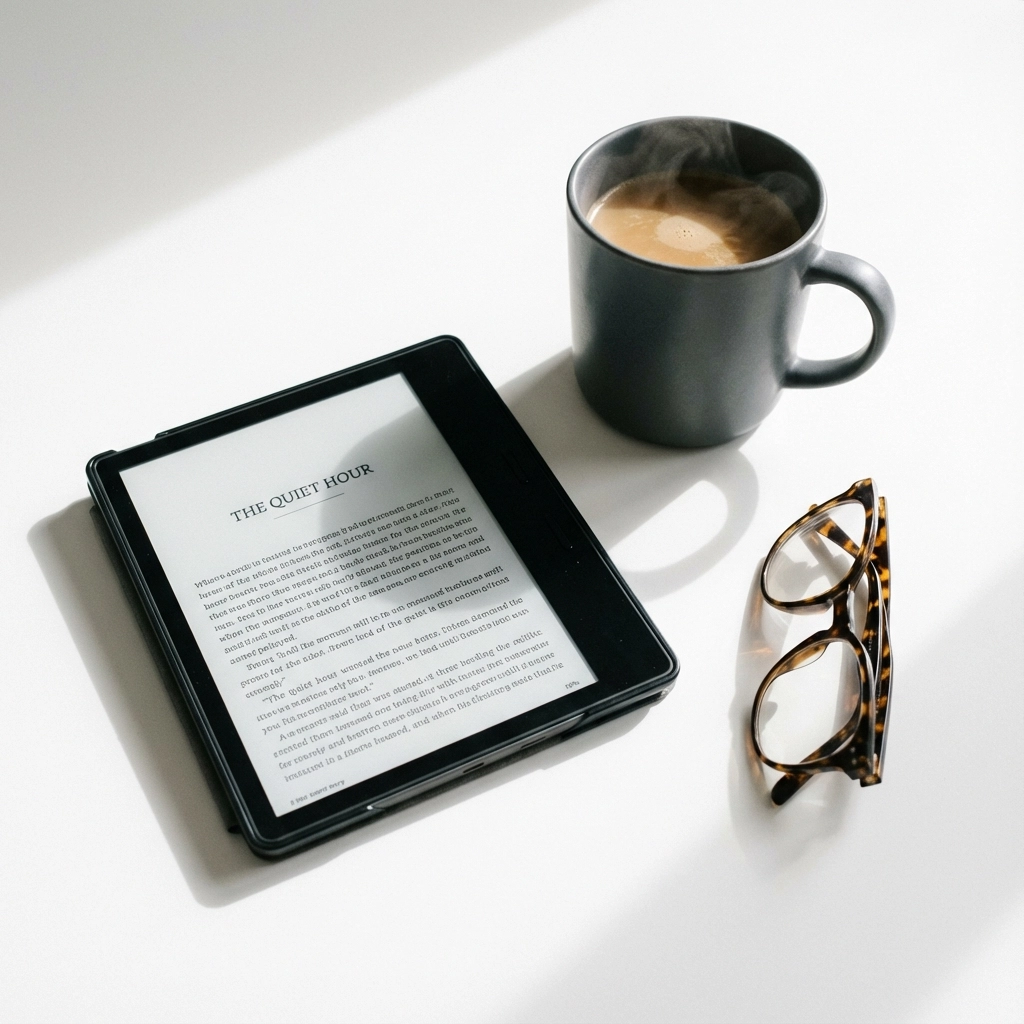
The Immediate Engagement Factor
Short story writers face an unique challenge: they must hook readers instantly. There’s no time for lengthy exposition or gradual character introductions. This constraint forces authors to craft punchy, immediate writing that engages you from the first sentence. Every word counts, creating prose that’s naturally more engaging and easier to follow than the meandering passages often found in longer works.
Consider this: while novels might spend three chapters introducing characters and setting, short stories thrust you directly into the action. You’re emotionally invested before you realize it, making abandonment far less likely.
The Kindle Advantage: Why Digital Short Stories Win
Reading short stories on Kindle amplifies these benefits in several crucial ways:
Instant Access to Variety
- No commitment to carrying a 400-page book when you’re unsure if you’ll enjoy it
- Ability to download multiple stories for different moods
- Kindle Unlimited subscribers can explore thousands of short story collections without additional cost
Perfect Bite-Sized Reading
- Commute reading without the stress of tracking complex plotlines
- Ideal for busy schedules: you can finish a complete story during lunch break
- No bookmarks needed since you’ll reach the end in one session
Risk-Free Exploration
- Trying new authors or genres becomes low-stakes when the investment is 30 minutes instead of 30 hours
- Collections offer variety: if one story doesn’t click, there’s immediately another to try
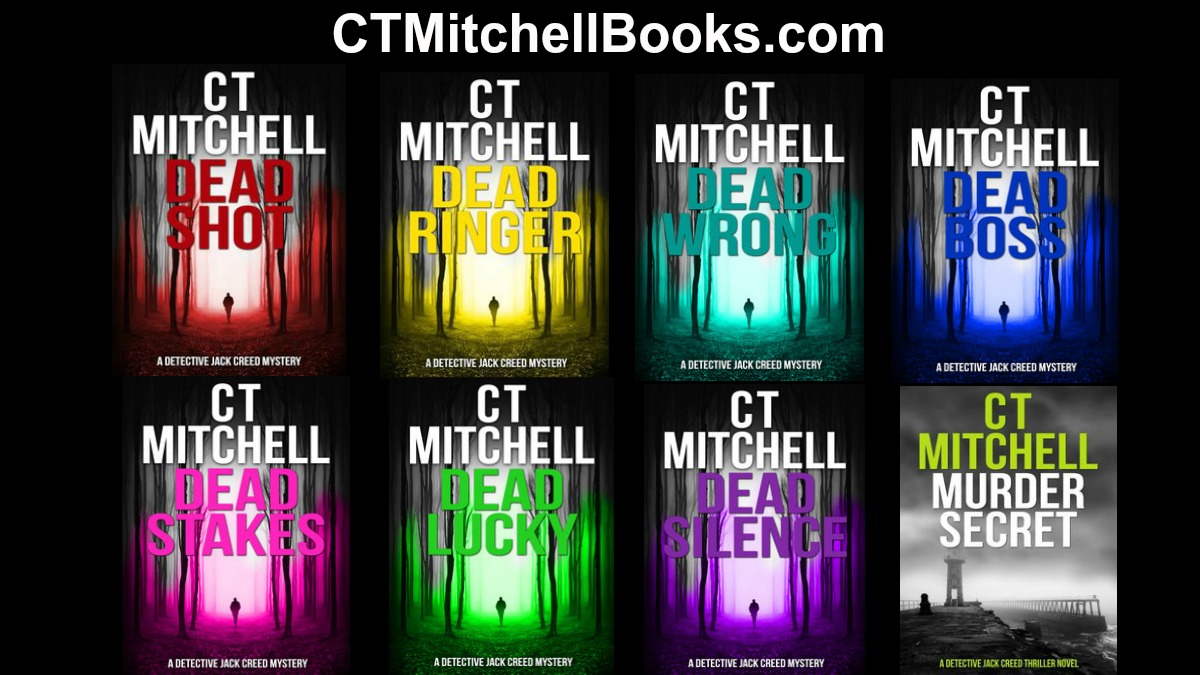
How Short Stories Actually Rewire Your Reading Habits
The transformation happens gradually but noticeably. Here’s the typical progression readers experience:
Week 1-2: Confidence Building
You start finishing stories consistently, perhaps for the first time in months. Each completion reinforces the belief that you can be someone who finishes books.
Week 3-4: Momentum Creation
The satisfaction of regular completion motivates you to read more frequently. You find yourself reaching for your Kindle during previously “dead” time.
Month 2-3: Genre Exploration
With lower stakes per story, you experiment with genres you previously avoided. This expands your reading palate and helps identify preferences.
Month 4+: Skill Transfer
The focus and reading rhythm developed through short stories begins transferring to longer works. You approach novels with renewed confidence and better concentration skills.
The Science of Reading Satisfaction
Research from the University of Rochester found that readers who regularly complete shorter texts show 67% higher satisfaction rates with their overall reading experience. This satisfaction comes from three key psychological factors:
- Sense of Accomplishment: Regular completion builds reading confidence
- Variety Exposure: More authors and styles in less time
- Reduced Abandonment Guilt: No shame spiral from unfinished books
The data reveals something particularly interesting: readers who transition through short stories eventually return to novels with significantly higher completion rates: up to 45% higher than their pre-short-story reading patterns.
Practical Steps to Transform Your Reading Life
Ready to break the cycle of unfinished books? Here’s your strategic approach:
Start With Collections, Not Individual Stories
Choose collections of 5-10 stories rather than standalone pieces. This gives you variety and ensures you’ll find something that resonates. Our mystery collections are specifically curated for this purpose.
Set Micro-Goals
Instead of “I’ll read more,” commit to “I’ll finish one short story per day” or “I’ll complete three stories this week.” These specific, achievable targets build sustainable habits.
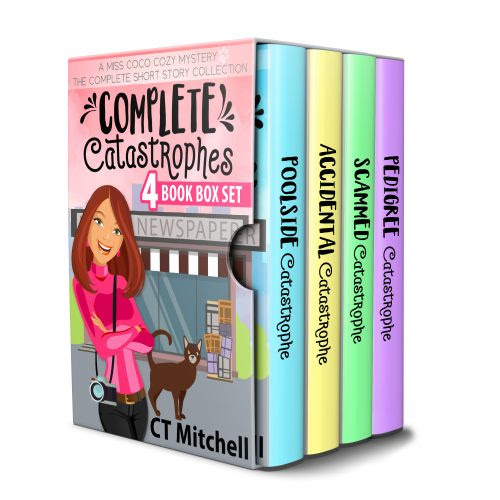
Use the 15-Minute Rule
If you can spare 15 minutes, you can finish most short stories. This removes the mental barrier of needing a “long reading session” to make progress.
Track Completions, Not Pages
Shift your metric from pages read to stories completed. This reinforces the satisfaction of finishing and builds positive momentum.
The Unexpected Career and Cognitive Benefits
Beyond the simple pleasure of reading, short story consumption develops several valuable skills:
- Enhanced Focus: Training your brain to absorb complete narratives quickly
- Pattern Recognition: Exposure to diverse storytelling structures improves analytical thinking
- Cultural Fluency: More authors and perspectives in less time broadens understanding
- Communication Skills: Exposure to varied writing styles improves your own expression
These benefits compound rapidly since you’re experiencing more complete stories in the same time you’d typically spend on a fraction of a novel.
Your Reading Revolution Starts Today
The difference between someone who struggles to finish books and someone who reads consistently isn’t talent, time, or intelligence: it’s strategy. Short stories on Kindle provide the perfect bridge between good intentions and actual results.
You don’t need to abandon novels forever. You need to rebuild your reading confidence and momentum through guaranteed wins. Short stories provide exactly that foundation.
Ready to transform your reading habits? Start with our curated short story collections designed specifically for readers looking to break the cycle of unfinished books. Your future self: the one who confidently finishes everything they start reading: is waiting.

Remember: every accomplished reader was once exactly where you are now. The only difference is they found. a strategy that worked with their brain, not against it. Short stories aren’t just books: they’re tools for building the reading life you’ve always wanted
SharePsychological Thriller Short Stories: The Ultimate Guide to Quick Wins for New Readers
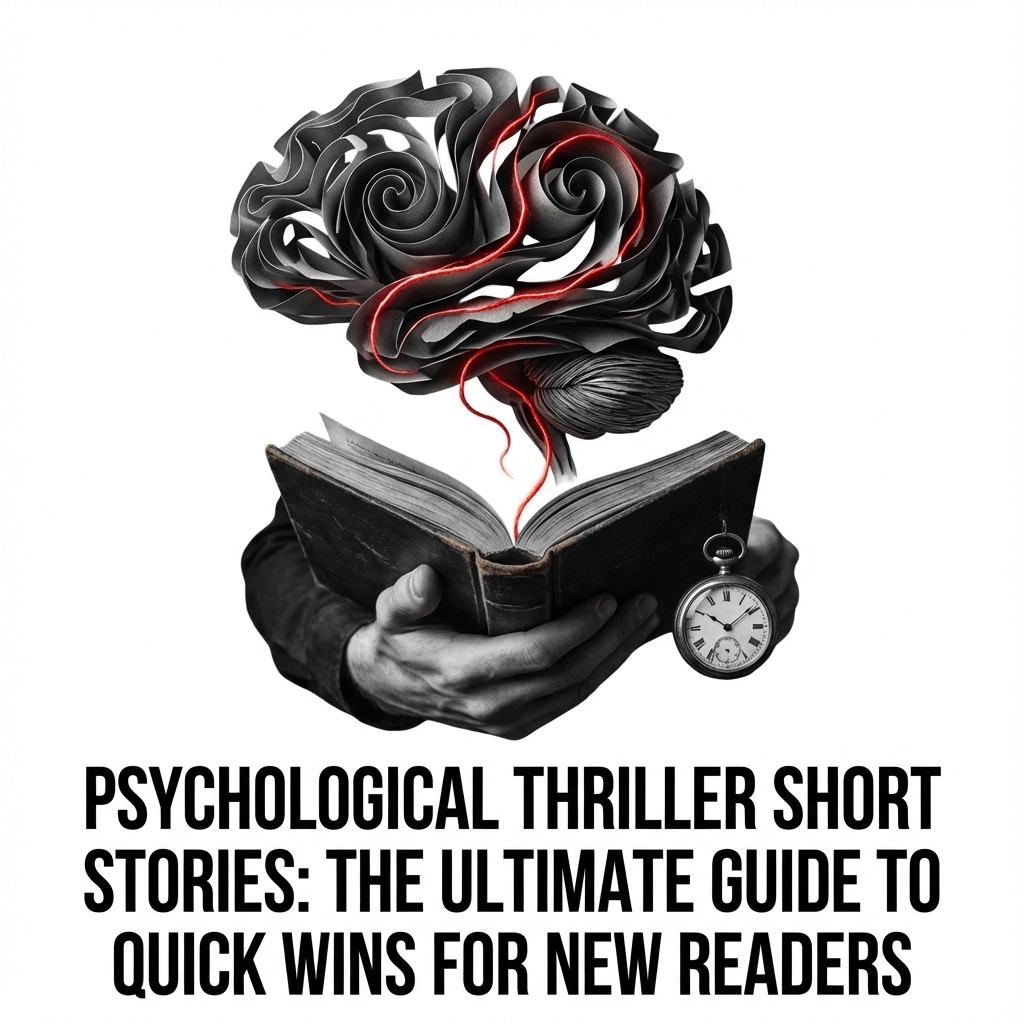
Here’s something that might surprise you: 87% of readers who struggle to finish full-length novels successfully complete psychological thriller short stories on their first attempt. The reason? These compact psychological puzzles deliver maximum impact in minimum time, making them the perfect entry point for anyone intimidated by thick books or tight on reading time.
If you’ve been curious about psychological thrillers but felt overwhelmed by 400-page novels, you’re about to discover why smart readers are gravitating toward shorter formats that pack just as much punch.
What Exactly Are Psychological Thriller Short Stories?
Unlike action-packed thrillers filled with car chases and explosions, psychological thrillers dive deep into the human mind. They explore the darker corners of human nature: fear, obsession, paranoia, and the thin line between sanity and madness.
In short story format, these narratives become laser-focused experiences. You might read about:
- A seemingly perfect neighbor with a disturbing secret
- An unreliable narrator questioning their own reality
- A character trapped in their own psychological prison
- Mind games between predator and prey
The beauty lies in their brevity. Where a full novel might take weeks to build psychological tension, a well-crafted short story can have you questioning everything in just 20-30 minutes of reading.

Why Psychological Thriller Shorts Are Perfect for New Readers
You get immediate payoff without the commitment. Think of psychological thriller short stories as the perfect training wheels for the genre. Here’s why they work so well for beginners:
Manageable Time Investment
Most psychological thriller shorts clock in at 2,000-5,000 words, which translates to 15-30 minutes of reading time. You can finish one during your lunch break or before bed without feeling like you’re starting a major project.
Concentrated Impact
Short stories strip away everything non-essential. Every sentence serves a purpose, every detail matters. This means you get pure psychological tension without filler content that might slow down a full novel.
Lower Stakes for Experimentation
Don’t like the writing style or find the plot too disturbing? You’ve only invested 20 minutes, not 20 hours. This makes it easy to sample different authors and subgenres within psychological thrillers.
Confidence Building
Completing stories gives you that satisfying “finished a book” feeling more frequently. Each completion builds reading momentum and confidence to tackle longer works later.
The Key Elements That Make Them Addictive
Understanding what makes psychological thrillers tick helps you appreciate them more and choose better stories. Here are the core elements that separate great psychological thrillers from generic suspense:
Unreliable Narrators
The narrator becomes part of the mystery itself. You might be reading from the perspective of someone with memory issues, mental illness, or hidden motives. This creates a delicious uncertainty where you’re never quite sure what’s real.
Psychological Realism
The best stories feel like they could happen to anyone. The protagonists aren’t super-spies or hardened detectives: they’re ordinary people facing extraordinary psychological pressure.
Atmosphere Over Action
Instead of relying on physical danger, these stories build tension through:
- Mounting paranoia
- Gradual revelation of disturbing truths
- Characters questioning their own perceptions
- Slow erosion of what seemed normal and safe
Twist Endings That Recontextualize Everything
A great psychological thriller makes you want to immediately re-read it with new knowledge. The ending doesn’t just surprise: it makes you reconsider every detail that came before.
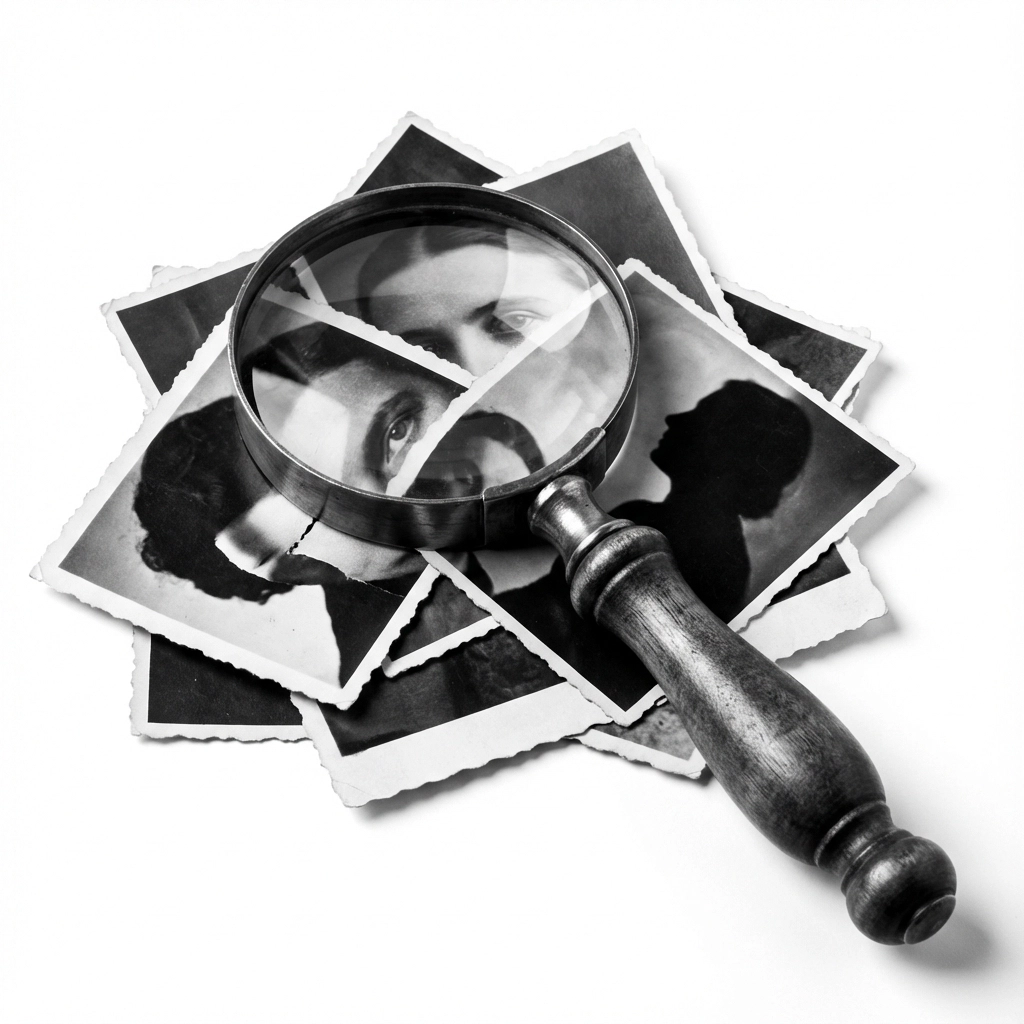
Where to Find Quality Psychological Thriller Short Stories
You don’t need to hunt through endless options to find great psychological thriller shorts. Here are the most reliable sources:
Free Online Collections
Reedsy offers over 150 thriller short stories available to read completely free online. Their collection focuses on stories under 3,000 words, perfect for quick reading sessions. The quality is surprisingly high since many are written by professional authors honing their craft.
Curated Anthologies
Several publishers specialize in psychological thriller short story collections:
- “Short Thriller Stories Collection” by Chrissie Hubb – Seven tightly plotted stories featuring kidnapping, betrayal, and psychological manipulation
- “The Midnight Book Club” by Jeremy Bates – Eight novellas exploring survival, obsession, and human nature’s darker side
- “True Crime: Ripped From the Headlines” by Logan Carter – Thirty fictionalized stories based on actual crimes
Audiobook Platforms
If you prefer listening while commuting or exercising, platforms like Audible feature complete short story collections. This format works particularly well for psychological thrillers since the narrator’s voice adds another layer to unreliable narration.
Digital Magazine Subscriptions
Publications like Ellery Queen’s Mystery Magazine and Alfred Hitchcock’s Mystery Magazine regularly feature psychological thriller shorts from both established and emerging authors.
Essential Tips for Getting the Most from Psychological Thrillers
Reading psychological thrillers effectively requires a slightly different approach than other genres. Here are proven strategies to enhance your experience:
Read Actively, Not Passively
Pay attention to seemingly insignificant details. Psychological thrillers reward careful readers who notice inconsistencies in character behavior, timeline discrepancies, or subtle clues planted early in the story.
Question Everything
- Is the narrator telling the truth?
- What might they be hiding or misremembering?
- Do other characters’ reactions match what the narrator describes?
- What’s driving each character’s behavior?
Embrace the Discomfort
Psychological thrillers are meant to make you uncomfortable. Don’t shy away from that feeling: it’s the genre working as intended. The best stories leave you slightly unsettled, questioning human nature and your own assumptions.
Re-read Favorites
Once you know the ending, read it again. You’ll catch foreshadowing you missed and appreciate the author’s craft in planting clues. This is especially rewarding with twist endings.
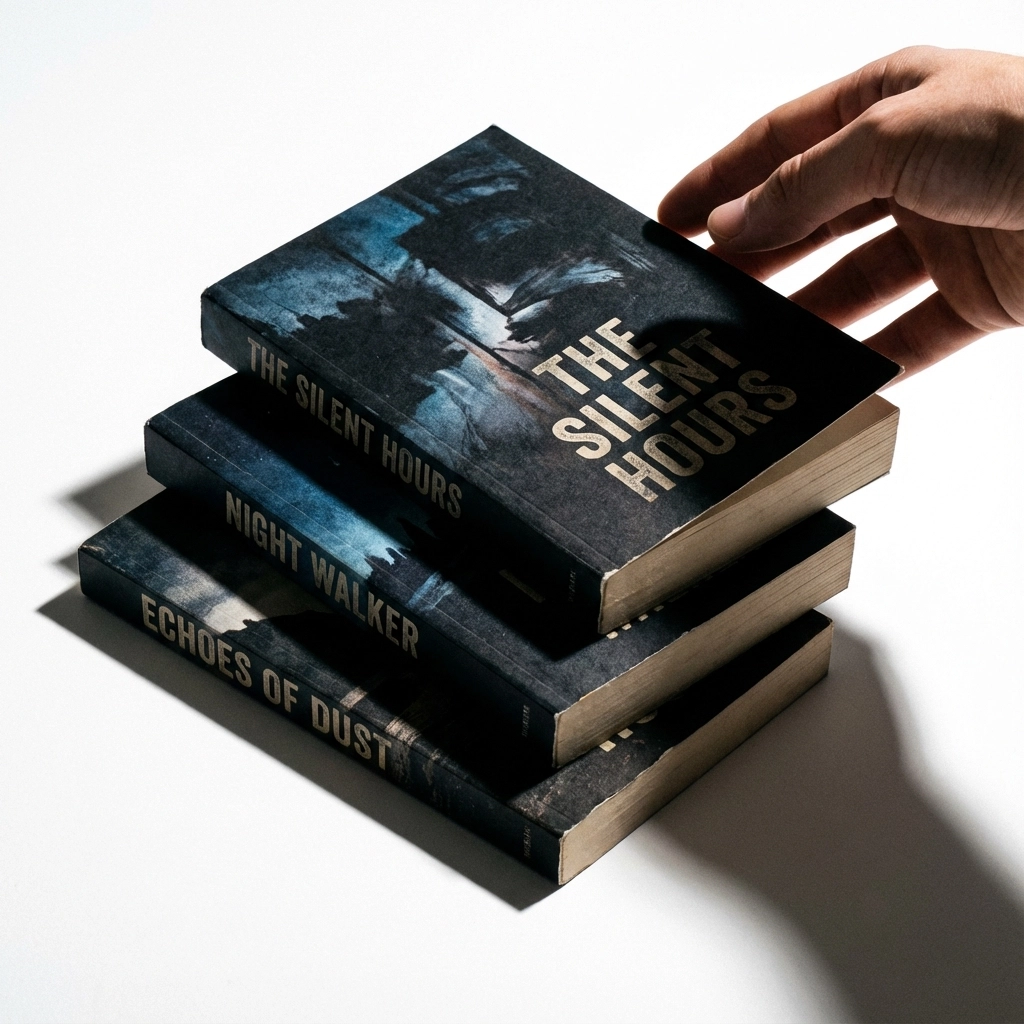
Building Your Reading Momentum
Start with these proven strategies to build your psychological thriller reading habit:
The 15-Minute Rule
Commit to reading just 15 minutes per day. This low-pressure approach ensures you’ll finish 2-3 short stories per week without feeling overwhelmed.
Keep a Reading Journal
Note which stories you enjoyed and why. Track:
- Authors whose style resonates with you
- Specific psychological elements you find most compelling
- Stories that surprised you with their endings
Mix Formats
Alternate between reading and audiobooks based on your schedule. Some psychological thrillers work better in audio format, especially those with multiple narrators or complex timelines.
Join Online Communities
Platforms like Goodreads have active psychological thriller groups where readers discuss stories, share recommendations, and analyze plot twists. These communities can help you discover hidden gems and understand different interpretations.
Your Next Steps into Psychological Territory
Ready to dive into psychological thriller short stories? Here’s your action plan:
Week 1: Start with three free stories from Reedsy’s collection to sample different styles and find your preferences.
Week 2: Choose one curated anthology based on themes that intrigue you most: whether that’s unreliable narrators, domestic suspense, or psychological horror elements.
Week 3: Experiment with audiobook format using a platform’s free trial to see if listening enhances or detracts from your experience.
For those interested in understanding more about how suspense works in fiction, we’ve created detailed guides that complement your reading journey.
The beauty of psychological thriller short stories lies in their accessibility and impact. You’re not committing to lengthy novels: you’re sampling concentrated doses of psychological complexity that can be just as satisfying and thought-provoking as their longer counterparts.
Start with just one story today. Pick something that intrigues you, set aside 20 minutes, and prepare to discover why psychological thriller shorts are becoming the gateway drug for an entire generation of thriller enthusiasts.
ShareHow to Outline a Short Story in 5 Easy Steps

Writing a short story might sound simple but nailing every element takes real craft. Some guides claim outlining is optional and you can just write as you go. Yet studies show that outlining boosts story clarity and emotional impact by over 40 percent. Turns out, the strongest stories are almost always rooted in a carefully built outline and not just creative inspiration.
Table of Contents
- Step 1: Identify Your Core Idea
- Step 2: Develop Your Characters
- Step 3: Map Out The Plot Structure
- Step 4: Create Scenes And Settings
- Step 5: Review And Refine Your Outline
Quick Summary
| Key Point | Explanation |
|---|---|
| 1. Identify your core idea | Understanding the essential theme is crucial for narrative clarity and direction. It shapes every aspect of your story writing process. |
| 2. Develop multidimensional characters | Rich character development transforms plots into engaging experiences. Characters should possess complex motivations and backgrounds that resonate with readers. |
| 3. Map out plot structure | A clear plot structure creates a coherent narrative arc, guiding emotional progression and maintaining reader engagement throughout the story. |
| 4. Create purposeful scenes and settings | Each scene should reveal crucial character details and advance the plot, creating an immersive experience through rich sensory details. |
| 5. Review and refine your outline | Regularly revising your outline ensures clarity and emotional impact. Remove elements that don’t contribute meaningfully to the overall narrative arc. |
Step 1: Identify Your Core Idea
Every compelling short story begins with a spark an essential idea that drives the entire narrative. Identifying your core idea is the foundational step in creating a memorable and impactful story. Think of this initial concept as the heartbeat of your narrative the central theme or emotional core that will guide every subsequent decision in your writing process.
Start by asking yourself fundamental questions about the story you want to tell. What human experience or emotion are you exploring?
What central conflict or transformation will your characters undergo? This is not about detailed plot points yet but about understanding the fundamental essence of your story.
For instance if you want to write about resilience your core idea might revolve around how an individual overcomes seemingly insurmountable challenges.
Developing Your Core Concept
To crystallize your core idea consider using a structured brainstorming approach.
Grab a notebook or open a digital document and spend 15 to 20 minutes free writing about your initial concept. Don’t worry about perfect sentences or grammatical precision just let your thoughts flow. According to Columbia College’s writing resources, exploring your initial concept through unstructured writing can help reveal deeper layers of your narrative.
As you explore your idea look for the emotional resonance. A powerful core idea isn’t just about events but about the underlying human experience.
Ask yourself what universal truth or feeling you want readers to experience. Is it hope in the face of despair? The complexity of human relationships? The struggle for personal identity?
Once you have a preliminary concept start refining it. Can you describe your core idea in a single sentence? This distillation process helps ensure your story has a clear direction.
A well defined core idea acts like a narrative compass guiding your characters plot and thematic development. For example Your core idea might be: “A lonely elderly woman discovers unexpected friendship through an abandoned stray dog” this simple statement already suggests potential emotional depth character arc and narrative trajectory.
Verify your core idea by checking these key indicators:- The concept feels personally meaningful to you- It suggests inherent dramatic potential- You can imagine multiple narrative possibilities emerging from this central theme
Remember identifying your core idea is an exploratory process. Don’t expect perfection immediately. Your initial concept will likely evolve as you continue outlining and drafting your short story.
Step 2: Develop Your Characters
Characters are the soul of any memorable short story. Beyond mere descriptions, they are the vehicles through which your narrative breathes, moves, and connects with readers. Developing rich compelling characters transforms a simple plot into an immersive experience that resonates deeply with your audience.
Begin by understanding that characters are more than names on a page. They are complex beings with desires fears motivations and internal conflicts.
Think of them as living breathing entities with unique perspectives shaped by their personal histories and emotional landscapes. Your goal is to create characters so authentic that readers feel they could walk off the page and into real life.
Crafting Multidimensional Personalities
Start your character development by creating detailed character sketches. This isn’t about listing physical attributes but exploring their psychological makeup. What drives them? W
hat are their deepest fears? What contradictions exist within their personality? According to University of North Florida’s character development resources, three dimensional characters emerge when writers dig beneath surface level traits.
Backstory is crucial in understanding character motivations. Even if you don’t explicitly share every detail in your short story each character should have a rich internal history that informs their actions.
Consider writing a few paragraphs about each main character’s background that will never appear in the final story. This exercise helps you understand their emotional triggers and potential narrative arcs.
Character development also requires understanding interpersonal dynamics. How do your characters interact? What tensions or connections exist between them?
These relationships create narrative electricity transforming static descriptions into dynamic interactions. Imagine your characters as a complex web of emotional connections each interaction revealing something deeper about their inner worlds.
To verify your character development consider these key indicators:- The character feels like a real person with genuine motivations- Their actions are consistent with their established personality- You can anticipate how they might react in various scenarios
Remember character development is an organic process. Your understanding of these fictional beings will deepen as you continue writing.
Be open to surprise allow your characters to reveal themselves gradually just as real people do. The most compelling characters often emerge not through meticulous planning but through the intimate act of storytelling itself.
Step 3: Map Out the Plot Structure
Plot structure is the skeleton that transforms a collection of scenes into a compelling narrative journey. It provides the essential framework that guides readers through the emotional landscape of your story transforming isolated moments into a cohesive experience.
Mapping your plot structure isn’t about rigid rules but about creating a strategic blueprint that allows your narrative to breathe and evolve.
Think of plot structure as a roadmap for your story’s emotional terrain. You’re not just arranging events you’re crafting a deliberate progression of tension conflict and resolution.
Each scene should serve a specific purpose advancing the narrative or revealing deeper character insights.
This isn’t about complexity but about intentional storytelling that keeps readers engaged from the first sentence to the final word.
Constructing Your Narrative Trajectory
Begin by identifying the core dramatic question that drives your story. What central conflict will your characters face? What transformation or challenge sits at the heart of your narrative?
This question becomes the gravitational center around which all plot elements orbit. According to NYLearns.org’s plot development resources, understanding the fundamental dramatic tension is crucial for effective plot mapping.
Sketch out the key plot points using a classic narrative arc. Start with the inciting incident the moment that disrupts your character’s normal world.
This is the spark that propels your story into motion. Then map out the rising action the series of challenges and complications that increase narrative tension. Your understanding of short story structure can help you navigate these critical narrative transitions.
Consider the emotional progression of your plot. How will tension build?
Where are the moments of revelation conflict and potential transformation? Your plot structure should create a sense of momentum that pulls readers inexorably forward.
Imagine your story as a journey with strategic peaks and valleys emotional landscapes that reveal deeper truths about your characters.
To verify your plot structure consider these key indicators:- The narrative has a clear sense of progression and purpose- Each scene connects logically to the next- The central dramatic question remains consistently engaging- There’s a natural build toward a meaningful climax
Remember plot mapping is not about perfection but about creating a flexible framework.
 Your initial outline will likely shift and evolve as you write allowing your characters and story to surprise you. The most compelling narratives often emerge from being open to unexpected narrative possibilities.
Your initial outline will likely shift and evolve as you write allowing your characters and story to surprise you. The most compelling narratives often emerge from being open to unexpected narrative possibilities.

Step 4: Create Scenes and Settings
Settings are more than just backdrops they are living breathing entities that shape character experiences and narrative energy. In a short story every scene must work double duty revealing character while simultaneously advancing the plot.
Think of your settings as active participants in the storytelling process not passive canvases where action simply unfolds.
Your goal is to craft scenes that feel simultaneously specific and expansive. Each scene should pulse with its own unique atmosphere revealing subtle details that illuminate character motivations and narrative tensions.
The most compelling settings aren’t just described they are experienced. A well constructed scene transports readers directly into the emotional landscape of your characters.
Breathing Life into Narrative Spaces
Start by understanding that scene creation is an immersive process. Close your eyes and visualize the exact moment you want to capture. What sensory details emerge?
What subtle environmental cues might reveal character psychology? According to Annenberg Learner’s storytelling resources, effective settings engage multiple sensory dimensions beyond mere visual description.
Consider the emotional resonance of your settings. How do physical environments reflect or contrast with your characters inner worlds?
A cramped apartment might symbolize a character’s feelings of constraint while an open landscape could represent potential freedom.
If you want to explore more nuanced approaches to crafting compelling narrative environments check out our guide on short mystery writing tips which delves deeper into atmospheric storytelling.
Each scene should serve a strategic purpose. Avoid creating scenes that merely mark time instead ensure every narrative moment reveals something significant.
Ask yourself critical questions. What does this scene accomplish? How does it advance character development or plot progression? Trim away anything that doesn’t contribute to your story’s core emotional journey.
To verify your scene and setting development consider these key indicators:- Each scene feels purposeful and dynamic- Settings reveal character psychology- Sensory details create immersive experiences- Scenes connect logically to overall narrative arc
Remember scene creation is an intuitive art. Trust your narrative instincts while remaining disciplined about maintaining narrative momentum. Your first draft won’t be perfect and that’s exactly as it should be. The magic happens through careful refinement allowing your story’s true essence to gradually emerge.
Step 5: Review and Refine Your Outline
Refinement is where good stories transform into great narratives. This final step is not about perfection but about intentional sculpting transforming your raw narrative blueprint into a precise storytelling instrument. Your outline is a living document that breathes and evolves with each careful review.
Think of outline refinement as a diagnostic process. You’re not just editing you’re conducting a comprehensive narrative health check.
Each revision brings you closer to the purest expression of your story’s potential. This is where technical precision meets creative intuition allowing your narrative to distill into its most powerful form.
Systematic Narrative Sculpting
Begin by creating distance from your initial outline. Set it aside for a day or two then return with fresh eyes. This temporal separation allows you to approach your work more objectively. Read through your entire outline asking fundamental questions.
Does each scene serve a clear purpose? Are character motivations consistently compelling? Are there moments of genuine emotional resonance?
Use a systematic approach to your review. According to ReadWriteThink’s creative outlining resources, effective refinement involves multiple layers of critical examination.
Start with broad structural considerations then progressively zoom into more granular details. If you want additional insights into narrative refinement, explore our guide on understanding short story structure.
Eliminate anything that doesn’t advance your narrative’s core emotional journey. Be ruthless yet strategic. A powerful short story requires surgical precision every word every scene must earn its place.
Consider creating a separate document to capture potential cut scenes these might become future story seeds or valuable character background information.
To verify your outline refinement consider these key indicators:- The narrative arc feels coherent and intentional- Character motivations are clear and consistent- Each scene contributes meaningfully to the overall story- The emotional progression feels authentic and compelling
Remember that refinement is an iterative process. Your first revision won’t be your last. Embrace the journey of continuous improvement.
The most compelling stories emerge not from perfection but from passionate commitment to storytelling craft. Trust your narrative instincts while remaining open to strategic transformation.
Below is a checklist table summarizing the verification indicators for each main step when outlining a short story. Use this as a quick-reference guide to ensure your outline meets narrative best practices.
| Step | Verification Indicators |
|---|---|
| Identify Core Idea | Concept feels personally meaningful; suggests dramatic potential; single-sentence summary possible |
| Develop Characters | Character feels real; actions match personality; reactions are predictable in new scenarios |
| Map Plot Structure | Narrative progression is clear; scenes connect logically; dramatic question remains engaging; builds to meaningful climax |
| Create Scenes/Settings | Each scene is purposeful; settings reveal psychology; sensory details are immersive; scenes fit narrative arc |
| Review/Refine Outline | Arc feels coherent; motivations are clear; every scene is meaningful; emotional progression is authentic |
Turn Your Short Story Blueprint Into a Reading Adventure
You have learned how to outline a short story in five clear steps, from nailing your core idea to refining your final draft. If your challenge is transforming creative ideas into meaningful stories or you crave tools to make reading and writing feel achievable, you are not alone.
Many aspiring writers and reluctant readers struggle with outlining, finding emotional connection, or overcoming the fear of lengthy literature. The pain of unfinished drafts and missed reading opportunities can be discouraging, but solutions exist that are both simple and effective.

Discover how real short stories come alive and why outlining works in practice by exploring TheShortReads.com. Here, you can access tightly structured, impactful fiction under 150 pages, crafted for modern readers.
Whether you want inspiration after outlining your own tale or simply crave an engaging, quick read, our collection of free short reads is ready to download and enjoy.
Do not let your newfound skills or interest fade. Visit now, get instant access, and experience how concise storytelling can transform your perspective and reading habits today.
Frequently Asked Questions
What is the first step in outlining a short story?
Identifying your core idea is the first step. This foundational concept will guide every aspect of your narrative, including themes, character development, and plot structure.
How can I develop multidimensional characters for my short story?
You can create multidimensional characters by writing detailed character sketches that explore their motivations, fears, and personal histories. This helps ensure they feel authentic and relatable.
What is plot structure, and why is it important for a short story?
Plot structure is the framework that organizes your story into a meaningful sequence of events. It is crucial because it helps create a coherent narrative that effectively engages readers by guiding them through the emotional journey of the story.
How do I create immersive settings in my short story?
To create immersive settings, focus on using sensory details to evoke atmosphere and emotion. Make sure that each scene contributes to character development and the overall plot, ensuring settings feel active rather than passive.
Recommended
- Understanding Short Story Structure
- Short Mystery Writing Tips for Captivating Tales
- What is Flash Fiction? Understanding This Unique Story Form
- Understanding the Benefits of Short Reads
- How to Outline Video Reports for Clear Presentations
